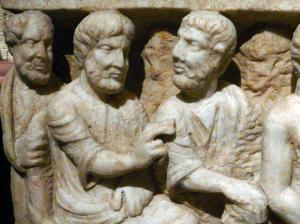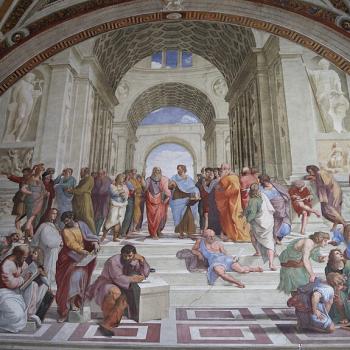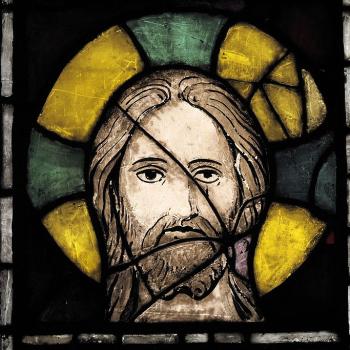
Discussing and explaining the Christian faith requires positive declarations, declarations which come out of and use human conventions. While the faith transcends such propositions, and so should not be confused merely with the memorization and declaration of them, we should recognize that such propositions help Christians express what their faith is about and share it with others. That is, there is some value in making them so long as we understand the limitations involved in their declaration.
When official propositional statements are made, that is, when the church, using its authority, creates propositions to be believed in order to deal with some denial of an element of the truth of the faith, Christians must affirm the meaning intended by those propositions. We should understand the limitations of human conventions, and give whatever caveats are necessary based upon them, but we should not use those caveats to deny the truth which is intended by them.
This is what apophatic theology teaches us: that whatever we say, whatever we declare, whatever we comprehend is less than the absolute truth itself, and so, we should not confine the truth to the letter of those propositions. This is a basic principle which should be engaged, but when we engage it, we should not use it to deny the proper use of conventions and propositions; we certainly should not use apophatic theology to deny any apprehension of the truth, for this leads to nihilism.
Proper application of apophatic theology makes way for and serves as the basis for cataphatic theology; the two go together. One without the other will always be erroneous, as either we find ourselves falling for nihilism or for idolatry. As long as we keep an apophatic caveat in place when we engage human conventions (including the propositions we use to explain the faith), which means, as long as we use conventions to point to the truth beyond the conventions themselves, we can find that the truth is, in a way, present in those conventions. We can even say that such propositions can serve as objects of the faith which Christians believe and accept, but only insofar as we allow them to be pointers or symbols in which the greater truth can be experienced (or found).
This is why we can agree with Cardinal Journet when he wrote: “The object of faith is both the statement so far as this touches reality and reality so far as this is shown in the statement. It is both the statement to which faith assents and reality that becomes open to it by its assent, toward which it trends, and in which it terminates.”[1]
The presence of the truth resides in the propositional statements so long as they are treated as real conventions, pointing to the truth which lies beyond the words and yet which can dwell in and provide its presence to us in and through those words. Every time we affirm this, we must make sure we do not fall for the temptation of turning those conventions into absolutes, that is, acting as if in and through them, in and through the letter instead of the spirit which lies in them, the absolute truth is to be found.
When we do that, we undermine the truth; we turn that which should serve as a symbolic pointer into an idol, no longer allowing our conventions to have the presence of the absolute truth be found in them. We end up closing ourselves off from the absolute truth because we become attached to its simulacrum. It is imperative that we keep ourselves open to what the propositions represent, seeking for the experience of the truth which is meant to be had by them instead of just studying, memorizing, such propositions because we believe them, as they are stated, to be in and of themselves, the fullness of the truth:
As the nature of honey can be described to the inexperienced not so much by speech as by the perception of it through taste, so the goodness of the heavenly Word cannot be clearly taught by doctrines, unless, examining to a greater extent the dogmas of truth, we are able to comprehend by our own experience the goodness of the Lord.[2]
God is both the truth and love; in accordance to divine simplicity, that means, the absolute truth is love. To experience the truth being pointed to by our dogmatic and doctrinal propositions, we must be open to love, we must experience love, we must let love influence our thoughts, and therefore, the way we express the faith itself. Without such an openness to love, without allowing the reality of love be manifested in our engagement of the faith, we betray the truth: “The truth of God is always betrayed when it is offered without the love of God.” [3]
Such betrayal leads us to close ourselves from the absolute truth, and so, undermine our ability to apprehend the absolute truth. The truth of the faith, the truth of God, the truth of love, is not something we simply study and learn, it is something we must experience and act upon. This is why a proper engagement of the dogmas of the faith must not be some mental exercise, it must not be seen as merely the learning of what those declarations have been and believing them to be true; rather, it is acting upon the practical applications of what those dogmas represent, an application which must always include some element of love in them.
Sadly, we want the truth to be easily comprehensible by us, something which we can control and manipulate, instead of something which is revealed to us with the expectation that we transform ourselves to harmonize with it. We want to comprehend the faith through propositions. We are tempted towards using some element of the truth, taking it out of his greater context, and in doing so, using it to create a new idol.
We want doctrines to develop along the lines of our own comprehension, that is, to reify our idolatrous approach to them, and through it, to reify the way things are now (or in the immediate past). Such reification requires us to sacrifice the truth itself for the sake of its simulacrum, trying to give our simulacrum a life of its own. Doctrinal development, to be sure, can and should be expected, but it should be done in order to reflect of our growing, our deepening experience of the truth (and the love which follows it).
We should be growing in love; when we do so, we will grow in our experience and understanding of the truth, especially the truth of God. Proper doctrinal development will result in the establishment of new propositions in order to defend the greater truth which we have apprehended from those who would deny it. Doctrinal development should be organic, going beyond speculative theology which only seeks to derive new content from what we already know.
For if believed doctrinal development only came from speculative innovation which has no basis on our experience of the truth, we end up denying doctrines which develop out our greater experience of the truth, and so, we end up creating a closed system for the defense of an idol instead of the absolute truth itself. But, if we understood the organic way dogmas and doctrines emerge, we will understand their use, and their limitation, as we will use them to seek after and apprehend more of the truth, and not just any kind of truth, but the truth of God, the truth which is one with love.
[1] Charles Cardinal Journet, What is Dogma? Trans. Mark Pontifex OSB (New York: Hawthorn books, 1964; repr. San Francisco: Ignatius Press, 2011), 19.
[2] St. Basil the Great, “Homily on Psalm 33” in Saint Basil: Exegetic Homilies. Trans. Agnes Clare Way, CDP (Washington, DC: CUA Press, 1963), 258.
[3] Charles Cardinal Journet, What is Dogma?, 30.
Stay in touch! Like A Little Bit of Nothing on Facebook.
If you liked what you read, please consider sharing it with your friends and family!
N.B.: While I read comments to moderate them, I rarely respond to them. If I don’t respond to your comment directly, don’t assume I am unthankful for it. I appreciate it. But I want readers to feel free to ask questions, and hopefully, dialogue with each other. I have shared what I wanted to say, though some responses will get a brief reply by me, or, if I find it interesting and something I can engage fully, as the foundation for another post. I have had many posts inspired or improved upon thanks to my readers.













